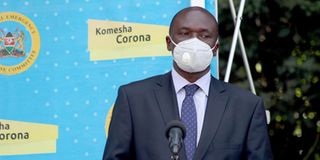Covid contact tracing made easy by tech

Health director-general Patrick Amoth. He says the ministry is using an app to track a person’s movements, giving officials a vital tool for limiting contagion risks.
What you need to know:
- The app accesses crucial information about a person's interactions if they contract the virus.
- All mobile phone numbers within the range of the infected person will be stored.
Contact tracing for suspected Covid-19 cases has never been this easy thanks to technology, says Dr Patrick Amoth, director-general in the Ministry of Health.
The ministry is using Jitenge app to do contact tracing. The app that was developed in Kenya in June last year allows health officials to track a person's movements and who they come into contact with, giving officials a vital tool for limiting contagion risks.
Jitenge, a Kiswahili word for self-isolate, is an innovation of mHealth Kenya developed as a module of the Emergency Alert and Reporting System (EARS) used by the Ministry of Health’s Emergency Operations Centre (EOC) to respond to infectious diseases.
The app accesses crucial information about a person's interactions if they contract the virus. All mobile phone numbers within the range of the infected person will be stored.
The technology, Dr Amoth said, has helped avert new surges in Covid-19 infections that might have overwhelmed hospitals while battling an outbreak that has infected close to a million people and killed more than 1,726 Kenyans in about nine months.
“With the app, we have had the fastest ever communication when someone develops symptoms because we are able to monitor from the system who they interacted with, who was in contact and this has tremendously reduced the risk of Covid-19 transmission in our community,” Dr Amoth said.
The app, he said, is faster since everyone who filled in their details is monitored daily. Immediately the person has been placed in the system, the report of the symptoms is given every morning, a reminder is sent to the patient after every two hours until 1pm, starting 8am to check on their symptoms. The message is then sent to the health worker in case of any change in the system and then a team is dispatched to the geo-location of the patient.
The app that was mostly used to trace anyone under home care programme, those in self quarantine, truck drivers and international travellers getting into the country has eased contract tracing and helped in faster clearance of the travellers at the airport.
For six months since the launch in June, 405,220 persons have been enrolled into the system with 332,896 at the airport traveller’s module. In the same system, the ministry has captured the details of 64,702 long distance truck drivers. About 5,985 from isolated quarantine facilities and 545 from home-based isolation and care.
Some 274,557 test results have been pulled from the designated laboratories for long distance truck drivers with 9,998 positive Covid-19 cases reported in the system as at January 15.
Digital verification codes
Painting a picture to the Sunday Nation how the app works for those travelling into the country, Mr Benjamin Otieno on Saturday said he was on his seventh day since he got back in the country and there is no single day that the app fails to remind him to record his symptoms.
“On the fifth day, I delayed updating my symptoms and after three reminders, a call came reminding me that the health officials were waiting for my details. This is efficient,” Mr Otieno said.
When he got into the country, he was given a QR code at the airport which was scanned and all his details were captured and the next day, they started reminding the traveller to key in his symptoms with a Yes or No answer.
“All the information is already captured. It takes less than two minutes to submit the daily responses. With this at least you get to know how someone is fairing. This helps in reducing the risk of infecting others,” he said.
Martin Owuor, who has used the app, praised it saying that it is one of the most efficient systems that the country has come up with. When Mr Owuor arrived in the country last week, he filled his details online for easy tracking.
“On Friday, I was reminded that it was my first day since I got into the country and that I needed to fill the form with my current symptoms, save and submit,” he said.
“This is your day one since you arrived in Kenya, please fill in the form online and submit,” says the note.
After the submission, a message is again sent. “Thank you for today’s response please don’t forget to fill in tomorrow,” says the acknowledgement note.
For four months, before the app was developed, suspected patients were physically traced. The patients were also required to manually fill out questionnaires for later analysis by a healthcare worker.
All travellers are required to present digitally verified proof of a negative Covid-19 test, which is in line with the Africa CDC Trusted Traveller (TT) initiative, an online system designed to authenticate and verify travellers’ Covid-19 certificates, no Kenyan laboratory will issue Covid-19 certificates without Trusted Travel codes.
Health Cabinet Secretary Mutahi Kagwe said the digital verification codes will ensure integrity of presented certificates, which until yesterday were presented on printed paper and were susceptible to forgery.
This means that if you intend to depart the country, you must first visit an authorised laboratory, obtain a PCR Covid-19 test with a negative result, and be issued a TT code that can be verified by airlines and immigration authorities. According to the government, all PCR Covid-19 testing laboratories are now part of the TT system.





